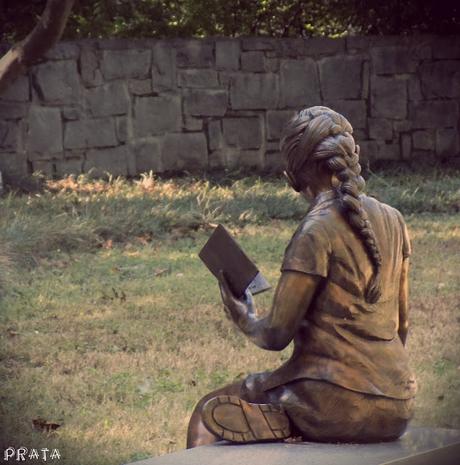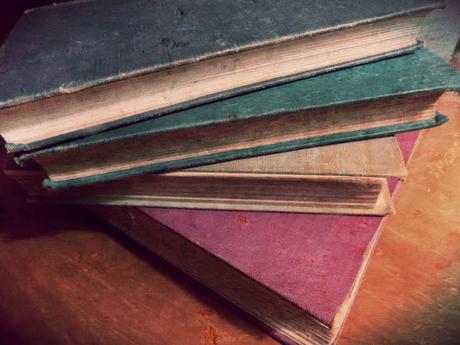I love to read. I've always been a reader. It became my profession, both as an elementary school teacher and then a journalist. I love connecting people with print.
Reading has been my friend all my life. This age-old activity provided an escape from difficult family situations. It offered never-ending, free entertainment. It informed and inspired.
When I was graciously saved by the grace and blood of Jesus, (2004) I added theological books to my reading pile, and of course I now read the Bible. There is so much to read, and not enough time!
As I've aged however, my eyes grow tired at night, and my energy flags. Admittedly, it's become easier to sit there like a lump in front of the TV after my evening tasks are done. The pile of books grows ever more towering and my desire to read rises ever more lofty, but the actual reading lessens more & more. The gap is wide.
One way I've attempted to combat the widening of the gap is to make a schedule for reading. I take the books I want to read, place them prominently at hand, within eye-view. Then I look at the total number of pages the book contains, and divide that total page count by a number
I've talked with a lot of Christians about this issue. 'Do you want to read? Yes! Do you have time to read? No!

Between work, family, other responsibilities, volunteering, church, and Bible reading/devotionals, pleasure reading comes dead last, falls off the table, and gets swept under the rug, more often than any of us would like!
Lots of people, including me, find it hard to achieve that balance.
IS reading for pleasure important? Should Christians be reading for pleasure at all? Does it redeem the time (Ephesians 5:16) to read novels or other secular books? How do we strike a balance with limited reading time and pleasure plus theological books?
Here are a few resources that discuss reading and may prove helpful for you.
Tim Challies has been a reader, book reviewer, and blogger for over ten years. Here is his take on reading and how the advent of technology/screens has changed it:
Tips for Reading Better & The Future of Books
Don't have time to read? Who does? Who even has time to evaluate a book you're reading or have just finished. Here is John Frame’s 9-Point Checklist for Evaluating Theological Writings
Jesus commanded His followers, "Take care how you listen" (Luke 8:18). The guys at Behold Your God podcast say Take Care How You Read, explaining,
Christians simply are readers. God has revealed Himself to humanity through special revelation, which is only recorded for us in the 66 books that make up our Bibles. Christianity is a reading religion by definition, but we are not at liberty to read indiscriminately.Justin Taylor at The Gospel Coalition presents an essay about Why J. I. Packer Reads Mystery Novels (Or, In Defense of Light Reading),
Do I urge everyone to read detective and cowboy and spy stories? No. If they do not relax your mind when overheated, you have no reason to touch them. Light reading is not for killing time (that’s ungodly), but for refitting the mind to tackle life’s heavy tasks (that’s the Protestant work ethic, and it’s true).
Tony Reinke wrote a book called Lit! Here's the blurb:
Whether reading is your addiction or your phobia, this book is for you. A practical guide built on the gospel, Lit! models the skills needed to build a balanced reading diet of Scripture, theology, and devotional books, but without overlooking important how-to books, great stories, and books meant to be enjoyed for pleasure.I bought Reinke's book but haven't read it yet. I plan to over the Christmas school break. Meanwhile I bought this book and started it. I like it a lot.
How to Read a Book: The Classic Guide to Intelligent Reading Revised Edition, Mortimer J. Adler and Charles Van Doren.
With half a million copies in print, How to Read a Book is the best and most successful guide to reading comprehension for the general reader, completely rewritten and updated with new material. Originally published in 1940, this book is a rare phenomenon, a living classic that introduces and elucidates the various levels of reading and how to achieve them—from elementary reading, through systematic skimming and inspectional reading, to speed reading. Readers will learn when and how to “judge a book by its cover,” and also how to X-ray it, read critically, and extract the author’s message from the text.
So that's it. You'll never get me to say that reading is passe, or that it doesn't matter, or that adults can dispense with it. I've found it harder to maintain the habit as I grow older and older, but that just means I have to work harder to make sure I always have good theological material at hand that includes the Bible, theology books & commentaries, and quality literature to devote my time to. The mind must be kept sharp. This is one way to do it. I hope any of these resources help you, if you, like me, are struggling with finding time to read.
"There is a great deal of difference between an eager man who wants to read a book and the tired man who wants a book to read." - G.K. Chesterton

